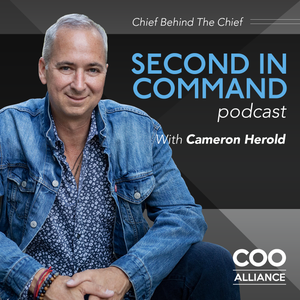
Second in Command: The Chief Behind the Chief
Cameron Herold
Chief Behind the Chief
- 8 minutes 18 secondsEp. 443 - Beyond the Bonus: Crafting Reward Systems That Inspire
In today's episode of the Second in Command podcast, Cameron explores the often-overlooked importance of recognizing and celebrating team achievements.
While leaders are often fixated on setting and achieving the next ambitious goal, they sometimes neglect the power of expressing gratitude for the hard work that has already been done. You'll discover a thoughtful approach to acknowledging success that can transform workplace energy, creating a foundation for continued growth.
You'll also hear about the complexities of structuring performance bonuses, a challenge many leaders face. Cameron outlines the pitfalls of traditional bonus systems, particularly how they can unintentionally demotivate employees.
This episode offers insights into the importance of recognizing team achievements and the complexities of designing effective performance bonus structures.
If you've enjoyed this episode of the Second in Command podcast, be sure to leave a review and subscribe today!
In This Episode You'll Learn:
- The value of celebrating team wins and expressing gratitude to maintain motivation and alignment with core values. (26:30)
- A new approach to performance bonuses, including identifying metrics that truly motivate and reward top performers. (27:23)
- Why consistent, fair compensation often outweighs the impact of traditional bonus systems for most employees. (28:22)
- Practical tips for structuring incentives to drive results without creating unnecessary complexity or demotivation. (30:15)
- And much more...
Resources:
Connect with Cameron: Website | LinkedIn
Get Cameron’s latest book "Second in Command: Unleash the Power of Your COO"
Get Cameron’s online course – Invest In Your Leaders
23 January 2025, 8:00 am - 41 minutes 43 secondsEp.442 - Stemregen COO, Spencer Matthews
In today's episode of The Second in Command podcast, Cameron is joined by Spencer Matthews, COO of Stemregen, a company that develops natural, plant-based stem cell enhancers and supplements.
During the conversation, Cameron and Spencer explore the intricacies of leadership and collaboration within dynamic, high-performing teams.
They discuss the challenges of transitioning into new roles and the importance of continuous skill development. Spencer shares insights into navigating unfamiliar territory, emphasizing the value of curiosity and adaptability when tackling areas outside of one’s comfort zone.
You'll discover the importance of aligning strengths and communication preferences through effective onboarding and coaching. Practical frameworks and tools are examined, illustrating how they can enhance workplace collaboration and foster stronger relationships between leaders and their teams.
Spencer touches on the balance between taking pride in one’s ability to execute tasks and recognizing the need to delegate effectively. The trade-offs of "getting things done" versus empowering others are explored, alongside strategies for overcoming common hurdles in leadership.
If you've enjoyed this episode of the Second in Command podcast, be sure to leave a review and subscribe today!
Enjoy!
In This Episode You'll Learn:
- The difference between Stemregen's supplements and traditional stem cell injections, emphasizing the natural process of mobilizing stem cells from the bone marrow to the bloodstream.
- The challenges of working remotely, including communication and repetition to ensure clarity.
- The executive sync process, which involves weekly meetings to review open partnerships, initiatives, and approvals.
- Spencer's use of Colby for team analysis and onboarding, and the value it provides for understanding team dynamics and strengths.
- And much more...
Resources:
Connect with Spencer: Website | LinkedIn
Connect with Cameron: Website | LinkedIn
Get Cameron’s latest book "Second in Command: Unleash the Power of your COO"
Get Cameron’s online course – Invest In Your Leaders
21 January 2025, 8:00 am - 21 minutes 56 secondsEp. 441 - Outsource Access Founder & CEO, Brad Stevens
In today's episode of the Second in Command podcast, Cameron is joined by Brad Stevens, Founder and CEO of Outsource Access, a fully managed outsourcing and virtual services firm.
During the conversation, you'll discover an innovative approach to tackling one of the biggest challenges faced by businesses today: balancing operational growth with employee satisfaction. Brad shares a unique strategy that blends global talent with local teams, creating an unexpected synergy that drives efficiency and builds loyalty.
You'll hear about the common misconceptions surrounding this approach, shedding light on why some attempts falter and others flourish. By focusing on collaboration, clear communication, and meticulous process documentation, companies can integrate new team members seamlessly into their operations.
This episode also highlights the importance of staying ahead in a rapidly changing business landscape. With technological advances and globalization reshaping the workforce, adopting forward-thinking solutions is no longer optional — it’s essential. Discover how embracing this mindset can transform the way your business operates and position it for long-term success.
If you've enjoyed this episode of the Second in Command podcast, be sure to leave a review and subscribe today!
Enjoy!
In This Episode You'll Learn:
- The various roles Outsource Access fills, such as customer service, operations, HR, recruiting, CRM administration, and bookkeeping. (10:01)
- The importance of documenting processes and creating detailed playbooks for clients. (13:34)
- The Outsource Access onboarding process and the role of strategic advisors in ensuring client success. (14:40)
- The cost savings of hiring senior talent from the Philippines compared to the US. (21:12)
- And much more...
Resources:
Connect with Brad: Website | LinkedIn
Connect with Cameron: Website | LinkedIn
Get Cameron’s latest book "Second in Command: Unleash the Power of Your COO"
Get Cameron’s online course – Invest In Your Leaders
16 January 2025, 8:00 am - 40 minutes 28 secondsEp. 440 - Pay As You Go COO Founder and Fractional COO, Milly Barker
During the conversation, Cameron and Milly dive into the intricate balance of leadership, strategy, and adaptability required to navigate the fast-evolving landscape of modern business.
You'll find a fresh perspective on how dynamic roles can bring order to chaos while preserving the creative spark essential for growth. Through candid insights, Milly shares her approach to designing flexible yet effective systems that allow companies to flourish during critical early stages.
They also explore the delicate interplay between innovation and structure in growing organizations. How much is too much when it comes to planning? How do leaders strike a balance between guiding their teams and fostering autonomy?
Milly also reflects on her unique career path, revealing how unconventional choices shaped their ability to lead and problem-solve. With a focus on people, purpose, and long-term sustainability, she shares how her experiences in philosophy, communication, and creative thinking helped build a foundation for success.
If you've enjoyed this episode of the Second in Command podcast, be sure to leave a review and subscribe today!
Enjoy!
In This Episode You'll Learn:
- Milly's role at the London School of Economics and Imperial College London, focusing on entrepreneurship and commercializing IP. (3:11)
- The importance of finding something that is both a strength and a passion to productize. (5:39)
- The balance between offering cost-effective solutions and delivering value to clients. (16:28)
- How Milly matches clients with the right fractional COOs based on experience and personality. (19:24)
- And much more...
Resources:
Connect with Milly: Website | LinkedIn
Connect with Cameron: Website | LinkedIn
Get Cameron’s latest book "Second in Command: Unleash the Power of your COO"
Get Cameron’s online course – Invest In Your Leaders
14 January 2025, 8:00 am - 23 minutes 5 secondsEp. 439 - Y Scouts CEO, Max Hansen
In today's episode of the Second in Command podcast, Cameron is joined by Max Hansen, CEO for Y Scouts, a purpose-based executive search firm. The discussion centers on the unique approach and philosophy of a retained executive search firm, exploring how their process differs from traditional contingent search models.
You'll discover a distinctive approach that incorporates aligning leadership with organizational culture, emphasizing purpose and values as key drivers in recruitment. Cameron and Max detail a covert discovery process that prioritizes building genuine connections with candidates before revealing company names or roles, fostering trust and deeper insights into alignment and fit.
You'll also gain insights into the client-recruiter relationship and the challenges companies face when managing their own hiring processes in conjunction with outside search firms. Advice centers on ensuring collaboration through clear communication, transparent processes, and structured planning—emphasizing that over-interviewing without strategy can lead to inefficiencies.
This conversation shows that successful recruitment relies on balance: combining established interviewing methods with strategic executive search insights while maintaining candidate engagement and experience throughout the hiring journey.
If you've enjoyed this episode of the Second in Command podcast, be sure to leave a review and subscribe today!
Enjoy!
In This Episode You'll Learn:
- The difference between contingent and retained search firms, including the thorough due diligence and market mapping done by retained firms. (0:43)
- The three unique elements of Y Scouts: aligning people with culture and values, role visioning, and a leadership model for hiring. (5:12)
- The importance of understanding a firm's process, how they find candidates, and their track record. (8:57)
- The need for collaboration and a scoring mechanism to ensure consistency in evaluating candidates. (14:56)
- And much more...
Resources:
Connect with Max: Website | LinkedIn
Connect with Cameron: Website | LinkedIn
Get Cameron’s latest book "Second in Command: Unleash the Power of Your COO"
Get Cameron’s online course – Invest In Your Leaders
9 January 2025, 8:00 am - 51 minutes 2 secondsEp. 438 - Taskrabbit CCO, Christopher Ager
In today's episode of the Second in Command podcast, Cameron is joined by Christopher Ager, Chief Commercial Officer for Taskrabbit, an online marketplace that matches freelance labor with local demand, allowing people to find help with tasks.
During the conversation, Cameron and Christopher explore the unique challenges and decisions involved in leading a growing company within a dynamic industry. Christopher reflects on his journey, highlighting how prioritization and a deep understanding of customer needs shape effective leadership.
You'll learn the importance of adaptability in leadership, particularly in terms of working remotely and managing a diverse team. Gain insights into navigating team dynamics, balancing personal and professional commitments, and ensuring alignment on goals and expectations.
Throughout this episode, you'll discover thoughtful advice for those at the start of their careers, emphasizing the value of focusing on work that sparks personal interest and collaboration with inspiring colleagues.
If you've enjoyed this episode of the Second in Command podcast, be sure to leave a review and subscribe today!
Enjoy!
In This Episode You'll Learn:
- How spending time understanding his team and operations during his first 90 days at Taskrabbit helped Christopher make informed, confident decisions. (12:50)
- The importance of aligning short-term actions with long-term goals and working closely with the CEO to ensure that the company is setting itself up for future success. (16:40)
- How Christopher utilized his early days in the company to focus on building strong, effective relationships with his leadership team and understanding the deeper issues in the business. (20:40)
- How he tailors his one-on-one approach based on individual team members' needs, focusing on their progress toward long-term goals and addressing roadblocks. (39:00)
- …And much more!
Resources:
Connect with Christopher: Website | LinkedIn
Connect with Cameron: Website | LinkedIn
Get Cameron’s latest book "Second in Command: Unleash the Power of Your COO"
Get Cameron’s online course – Invest In Your Leaders
7 January 2025, 8:00 am - 12 minutes 47 secondsEp. 437 - Rethinking Your Life Priorities
In today's episode of the Second in Command podcast, Cameron explores the challenge of balancing ambition with personal well-being in a world increasingly tethered to technology and productivity.
You'll discover candid insights from his entrepreneurial journey, recounting how the early drive to build successful businesses often came at the expense of deeper connections and self-care. Through reflections on past habits and the influence of generational wisdom, he examines the pervasive impact of modern distractions and the importance of reclaiming space for leisure and relationships.
You'll learn strategies for crafting a fulfilling life amidst the demands of leadership and work. Cameron highlights the transformative power of creating a "vivid vision" for one's personal and professional future, emphasizing the value of reverse-engineering goals to achieve a balanced and meaningful lifestyle.
This episode will challenge you to reconsider your definitions of success and satisfaction, and help you shift your mindset from chasing endless horizons to appreciating the journey.
If you've enjoyed this episode of the Second in Command podcast, be sure to leave a review and subscribe today!
In This Episode You'll Learn:
- How the drive to succeed can lead to unbalanced lifestyles and the importance of recognizing and addressing unhealthy work habits early. (14:02)
- Why delegating responsibilities and crafting a "vivid vision" for your personal and professional life are essential steps toward achieving balance and long-term success. (18:13)
- How to cultivate a rich and meaningful life through simple, budget-friendly experiences and intentional choices. (23:00)
- The importance of celebrating progress, enjoying the present moment, and avoiding the trap of endlessly chasing future goals. (25:55)
- And much more...
Resources:
Connect with Cameron: Website | LinkedIn
Get Cameron’s latest book "Second in Command: Unleash the Power of Your COO"
Get Cameron’s online course – Invest In Your Leaders
2 January 2025, 8:00 am - 37 minutes 59 secondsEp. 436 - Quickly Hire COO, Emily Hunkler
In today's episode of the Second in Command podcast, Cameron is joined by Emily Hunkler, Chief Operating Officer of Quickly Hire, a staffing and recruiting agency.
You'll hear the journey of a driven COO who shares her insights on building effective teams and fostering a thriving company culture. Emily discusses the importance of collaboration and adaptability in achieving ambitious goals, even when the path forward is uncertain.
Discover a unique approach to scaling businesses through innovative solutions that prioritize flexibility and efficiency. Drawing from personal experiences and the company’s own practices, Emily explores how leveraging fractional talent can empower organizations to achieve impactful results while remaining agile in dynamic markets.
This episode offers insights into the transformative power of embracing discomfort and taking risks in both professional and personal growth.
If you've enjoyed this episode of the Second in Command podcast, be sure to leave a review and subscribe today!
Enjoy!
In This Episode You'll Learn:
- The benefits of hiring fractional talent, including guaranteed weekly hours and the ability to grow teams. (9:54)
- The importance of communication skills and language proficiency for global talent. (14:13)
- Quickly Hire's marketing strategy, focusing on direct outreach and building a community for pros. (28:23)
- The challenges of managing a remote team and the importance of clear communication and regular check-ins. (30:52)
- And much more...
Resources:
Connect with Emily: Website | LinkedIn
Connect with Cameron: Website | LinkedIn
Get Cameron’s latest book "Second in Command: Unleash the Power of Your COO"
Get Cameron’s online course – Invest In Your Leaders
31 December 2024, 8:00 am - 16 minutes 32 secondsEp. 435 - Crafting a Vivid Vision for Unstoppable Growth
In today's episode of the Second in Command podcast, Cameron explores the challenges leaders face when trying to align their teams around a cohesive and forward-looking concept.
He shows how miscommunication or the absence of a shared perspective can lead to frustration and missteps. By drawing on vivid storytelling and relatable analogies, Cameron highlights the importance of painting a detailed and inspiring picture that captures the essence of future possibilities, rather than relying on conventional methods that often fall short of creating meaningful connections.
Discover the dynamics of motivation and how individuals find purpose when they can clearly see their role within a grander scheme. Learn how powerful this clarity can be in fostering creativity, unity, and excitement within a group.
Cameron also offers practical advice for those looking to inspire and lead. Whether it’s seeking inspiration in nature, letting go of distractions, or using unconventional tools to fuel creativity, this episode provides actionable insights for shaping a compelling vision.
If you've enjoyed this episode of the Second in Command podcast, be sure to leave a review and subscribe today!
In This Episode You'll Learn:
- Why crafting a three-year vivid vision is essential for creating excitement and alignment within an organization. (0:00)
- Strategies for mapping every aspect of your vision into tangible projects and creating a blueprint that prioritizes foundational tasks. (10:45)
- How a well-articulated vision not only motivates employees but also inspires external stakeholders to rally behind your goals. (15:33)
- The ways in which vivid vision can help businesses secure financing, land significant contracts, and recruit top talent. (19:24)
- Practical tips on finding the right mindset and setting to unleash your creativity, including methods to overcome distractions and stay focused. (21:24)
- And much more...
Resources:
Connect with Cameron: Website | LinkedIn
Get Cameron’s latest book "Second in Command: Unleash the Power of Your COO"
Get Cameron’s online course – Invest In Your Leaders
26 December 2024, 8:00 am - 42 minutes 51 secondsEp. 434 - Trellis COO, Ross Beyeler
In today's episode of the Second in Command podcast, Cameron is joined by Ross Beyeler, Chief Operating Officer of Trellis, a full-service eCommerce solutions agency.
During this fascinating conversation, you'll gain insights into the complexities of entrepreneurship, growth, and integration in the ever-evolving business landscape. Through personal anecdotes and insights, Ross reflects on the challenges of balancing ambition with vision, offering a candid perspective on lessons learned from early ventures.
You'll discover the significance of clarity in leadership roles, the value of systems for scaling operations, and the power of strategic frameworks for managing organizational dynamics. By exploring tools that foster alignment and problem-solving, discover the necessity of intentional planning and thoughtful execution in the midst of rapid change.
This episode offers actionable insights on driving growth, mastering leadership transitions, and thriving in a fast-paced, competitive environment.
If you've enjoyed this episode of the Second in Command podcast, be sure to leave a review and subscribe today!
Enjoy!
In This Episode You'll Learn:
- The formation of Growth Spark and its focus on E-commerce, particularly with Shopify. (13:54)
- The importance of understanding the "why" behind changes and involving the team in the decision-making process. (24:01)
- The long-term impact of COVID-19 on Trellis and the shift to a more digital-focused strategy. (33:55)
- The decision to sell Trellis to Zaelab and the vision shared by Evan, Zaelab's CEO. (33:49)
Resources:
Connect with Ross: Website | LinkedIn
Matt Wool and Robert "Bob" Glazier episodes
Connect with Cameron: Website | LinkedIn
Get Cameron’s latest book "Second in Command: Unleash the Power of Your COO"
Get Cameron’s online course – Invest In Your Leaders
- And much more...
24 December 2024, 8:00 am - 13 minutes 13 secondsEp. 433 - Beyond the Hustle: How to Craft a Life of Purpose
In today's episode of the Second in Command podcast, Cameron dives into his transformative journey, whose global experiences have reshaped his understanding of success, work, and personal fulfillment.
Starting with a deep family legacy of entrepreneurship, Cameron recounts building businesses, scaling organizations, and cultivating a mindset that prioritizes leadership development. From co-founding impactful ventures to creating a mastermind community for second-in-command leaders, his story showcases the highs and challenges of scaling ambitious projects.
Discover the pitfalls many entrepreneurs face — losing sight of hobbies, relationships, and personal growth amidst the demands of work. You'll find insights on stepping away from material excess and embracing experiences, relationships, and personal growth, which highlight a paradigm shift from work obsession to holistic living.
Whether you're an entrepreneur, a leader, or someone seeking more balance, this episode promises to ignite meaningful reflection on what truly matters in both work and life.
If you've enjoyed this episode of the Second in Command podcast, be sure to leave a review and subscribe today!
In This Episode You'll Learn:
- How a family legacy of entrepreneurial spirit shaped Cameron’s career, leading to ventures in franchising, leadership, and building globally recognized companies. (1:10)
- The importance of the COO role in scaling businesses, exemplified by his pivotal work with organizations like 1-800-GOT-JUNK. (2:20)
- How entrepreneurs can move beyond workaholism to prioritize their time and build stronger teams. (5:18)
- How shedding material excess and embracing experiences and relationships can lead to a richer, more meaningful life. (6:58)
- And much more...
Resources:
Connect with Cameron: Website | LinkedIn
Get Cameron’s latest book "Second in Command: Unleash the Power of Your COO"
Get Cameron’s online course – Invest In Your Leaders
19 December 2024, 8:00 am - More Episodes? Get the App
Your feedback is valuable to us. Should you encounter any bugs, glitches, lack of functionality or other problems, please email us on [email protected] or join Moon.FM Telegram Group where you can talk directly to the dev team who are happy to answer any queries.
 Built to Sell Radio
Built to Sell Radio
 EO 360°: A podcast by the Entrepreneurs’ Organization
EO 360°: A podcast by the Entrepreneurs’ Organization
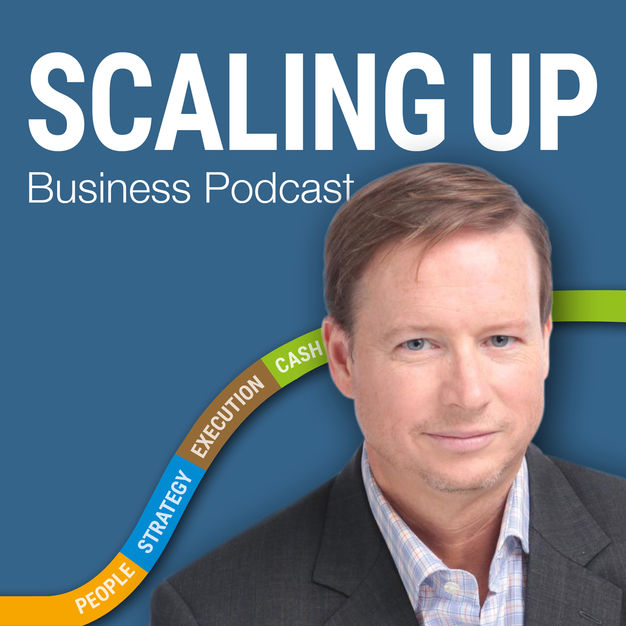 Scaling Up Business Podcast
Scaling Up Business Podcast
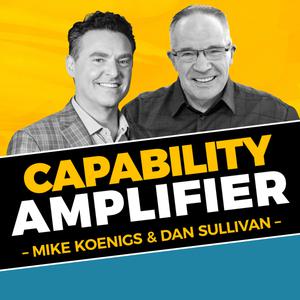 Capability Amplifier
Capability Amplifier
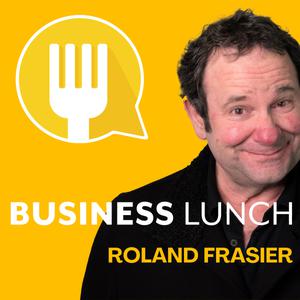 Business Lunch
Business Lunch
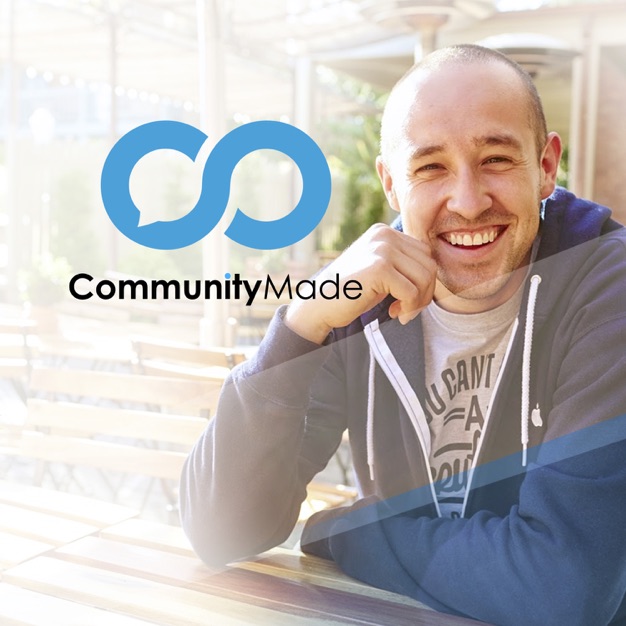 Community Made
Community Made